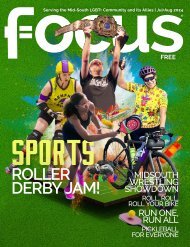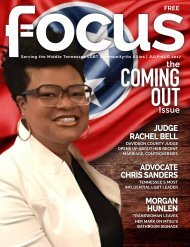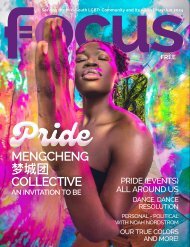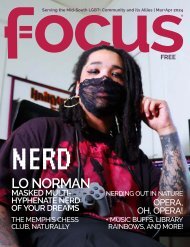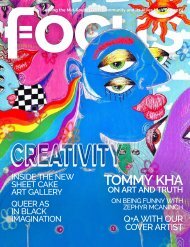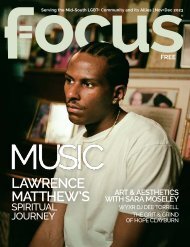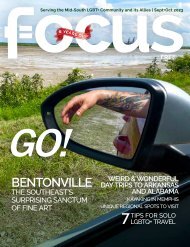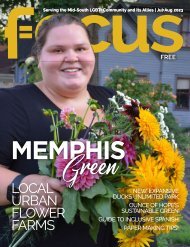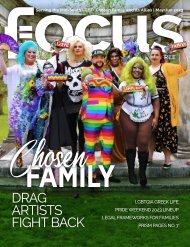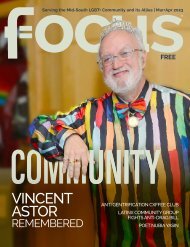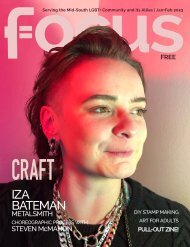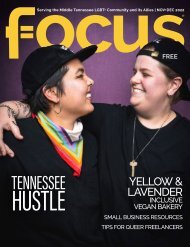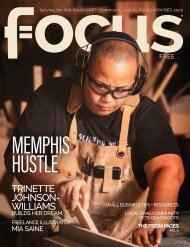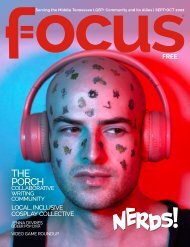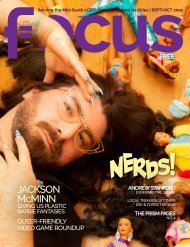2019 Issue 5 Sep/Oct - Focus Mid-Tenn Magazine
Create successful ePaper yourself
Turn your PDF publications into a flip-book with our unique Google optimized e-Paper software.
LGBT+ AND MINISTRY IN TENNESSEE<br />
By Margo Hall<br />
photo courtesy of<br />
Vanderbilt Divinity School<br />
Damien Domenack is<br />
an admission fellow and<br />
part of the admission team<br />
for the Vanderbilt School<br />
of Divinity. He recently<br />
graduated with a master’s<br />
degree in theology and is<br />
currently pursuing a Ph.D.<br />
He helps people find their<br />
calling in ministry and helps<br />
them determine if studying<br />
theology is right for them.<br />
Damien was drawn<br />
to ministry because his<br />
mom was a minister. He<br />
found some of the same<br />
tenants of Christianity in<br />
community organizing.<br />
When Damien was<br />
younger, he was not<br />
accepted by his church and<br />
filled that part of his life<br />
creating community spaces.<br />
He found those same tenants<br />
in the LGBT+ community,<br />
as well as the immigrant<br />
and people of color (POC)<br />
communities, that he<br />
discovered when moving to<br />
New York City to persue his<br />
undergraduate degree.<br />
During his time in New<br />
York, he was a part of the<br />
Audre Lorde Project and a<br />
founding member of Trans<br />
Justice. As a member of<br />
Trans Justice, he helped<br />
start the first-ever trans and<br />
gender non-conforming<br />
march for social and<br />
economic justice.<br />
Interconnections<br />
One of the things he<br />
loves about community<br />
organizing and working<br />
with people is giving people<br />
spaces to feel safe and to<br />
have conversations. This<br />
was a part of his work at the<br />
Vanderbilt LGBT+ center<br />
on campus. His academic<br />
work also includes working<br />
with prisons and individuals<br />
who are incarcerated. For<br />
Domenack, understanding<br />
our interconnectedness and<br />
roles with our communities<br />
is essential, especially for<br />
trans people. “Allowing for<br />
trans folks to exist outside<br />
just the trans bubble, is<br />
the reality of our lives,” he<br />
states. “The way we push<br />
forward in that reality is into<br />
that interconnectedness.”<br />
When asked about his<br />
path to understanding his<br />
relationship with God, he<br />
explains he was “made<br />
in the image of God,<br />
whichever form he chooses<br />
to believe in.”<br />
In recounting his religious<br />
trauma, Damien talks about<br />
how he learned his conflict<br />
was not his own. He said it<br />
comes from “negative ways<br />
of speaking about God” that<br />
feeds personal agendas,<br />
and that “it is a construct for<br />
hate, and that is not God,<br />
and that is not Christianity.”<br />
This hate impacts the<br />
LGBT+ and other minority<br />
communities around the<br />
world which means his<br />
trauma is a part of an<br />
oppressive system. So<br />
rather than reconciling<br />
what he feels does not<br />
belong to him, he focuses<br />
on that which is his own.<br />
A ministry based on<br />
community<br />
In finding happiness in his<br />
life and as a trans person,<br />
Damien says, “It didn’t<br />
trans focus<br />
“It didn’t come<br />
without challenge<br />
and learning about<br />
how my body,<br />
mind and soul<br />
all work together.<br />
Was that through<br />
Christianity? No.<br />
It was through part<br />
queer culture, yoga<br />
[and] Afrodiasporic<br />
religion. It is part of<br />
[my] ancestry and<br />
getting to know<br />
[myself] and [my]<br />
people and [my]<br />
trans identity.”<br />
— Damien Domenack<br />
come without challenge<br />
and learning about how my<br />
body, mind and soul all work<br />
together. Was that through<br />
Christianity? No. It was<br />
through part queer culture,<br />
yoga [and] Afrodiasporic<br />
religion.” He goes on to say,<br />
“It is a part of [my] ancestry<br />
and getting to know<br />
[myself] and [my] people<br />
and [my] trans identity.”<br />
Those are the things, he<br />
feels, Christian supremacy<br />
does not want you to know.<br />
Through this selfdiscovery,<br />
Domenack made<br />
the core of his work to be<br />
with transgender, nonbinary<br />
individuals who<br />
have religious trauma. That<br />
was the work he did at the<br />
LGBT+ center on campus<br />
and will be his continued<br />
work during divinity school.<br />
The community work he<br />
has dedicated his life to is<br />
his ministry.<br />
SUCCESS / SEP+OCT <strong>2019</strong> / focusmidtenn.com / Page 9




